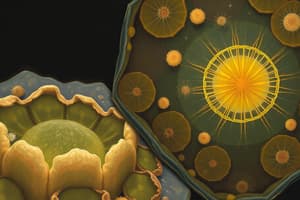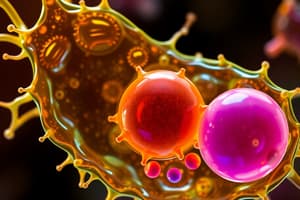Podcast
Questions and Answers
Who concluded: 'All animals are made of cells'?
Who concluded: 'All animals are made of cells'?
- Robert Hooke
- Matthias Schleiden
- Theodor Schwann (correct)
- Rudolf Virchow
Who concluded: 'All cells are made from other cells'?
Who concluded: 'All cells are made from other cells'?
- Matthias Schleiden
- Rudolf Virchow (correct)
- Robert Hooke
- Theodor Schwann
Who was the first to use a microscope?
Who was the first to use a microscope?
- Robert Hooke
- Anton Van Leeuwenhoek (correct)
- Rudolf Virchow
- Matthias Schleiden
Who concluded that 'All plants are made of cells'?
Who concluded that 'All plants are made of cells'?
The combined observations of Hooke, Schleiden, Schwann, Virchow & Von Leeuwenhoek helped form:
The combined observations of Hooke, Schleiden, Schwann, Virchow & Von Leeuwenhoek helped form:
Which scientist did NOT contribute to the cell theory?
Which scientist did NOT contribute to the cell theory?
Who observed cork and coined the word 'Cell'?
Who observed cork and coined the word 'Cell'?
Which of the following statements is NOT part of the cell theory?
Which of the following statements is NOT part of the cell theory?
Which is NOT a part of cell theory?
Which is NOT a part of cell theory?
Cell theory states:
Cell theory states:
Flashcards are hidden until you start studying
Study Notes
The Cell Theory
- Cells are the fundamental structural unit of all living organisms.
- The cell is too small to be seen by the naked eye, generally around five micrometers.
- Contains genetic information determining traits such as eye color, blood type, and sex.
Historical Contributions
- Zacharias Janssen (1590): Invented the first compound microscope, enhancing resolution with multiple lenses for 2D images.
- Robert Hooke (1665): Used a light microscope to observe cork, coining the term "cell" for the tiny chambers he saw. His findings were published in 'Micrographia'.
- Anton Van Leeuwenhoek (1673): First to use a microscope to study living microorganisms, referring to them as "animalcules." Also observed bacteria, marking a discovery of free-living cells.
- Robert Brown (1831): Discovered the nucleus within a cell.
- Felix Dujardin (1834): Identified the semi-fluid substance within cells, originally naming it "sarcode."
- Matthias Schleiden (1838): Concluded that all plants are composed of cells, collaborating to develop early principles of cell theory.
- Theodore Schwann (1839): Stated that all animals are made up of cells, working alongside Schleiden on cell theory.
- Jan Evangelista Purkinje (1840): Renamed "sarcode" to "protoplasm," referring to the first living substance in cells.
- Rudolph Virchow (1855): Established that cells arise from pre-existing cells, contributing the third tenet of cell theory. Coined the phrase "Omnis Cellula e Cellula," emphasizing cellular reproduction.
Modern Cell Theory
- Postulates that all living organisms consist of cells, which are the basic unit of life.
- All cells arise from pre-existing living cells, consolidating foundational principles of biology.
Quiz Preparation
- Important figures:
- Schleiden: All plants are made of cells.
- Schwann: All animals are made of cells.
- Virchow: All cells come from pre-existing cells.
- Remember the contributions of Hooke, Leeuwenhoek, Virchow, and Schwann in forming the Cell Theory.
Cell Components
- Cell Membrane:
- Composed of a flexible bilayer of proteins and lipids.
- Functions to separate the interior of the cell from the external environment and is selectively permeable.
- Cell Wall:
- A rigid layer found in plants, fungi, and some bacteria that provides support and protection.
Key Concepts
- All living organisms are composed of cells.
- Cells are the basic unit of life.
- Modern cell theory emphasizes that all cells come from pre-existing cells, underscoring the continuity of life at the cellular level.
Studying That Suits You
Use AI to generate personalized quizzes and flashcards to suit your learning preferences.




